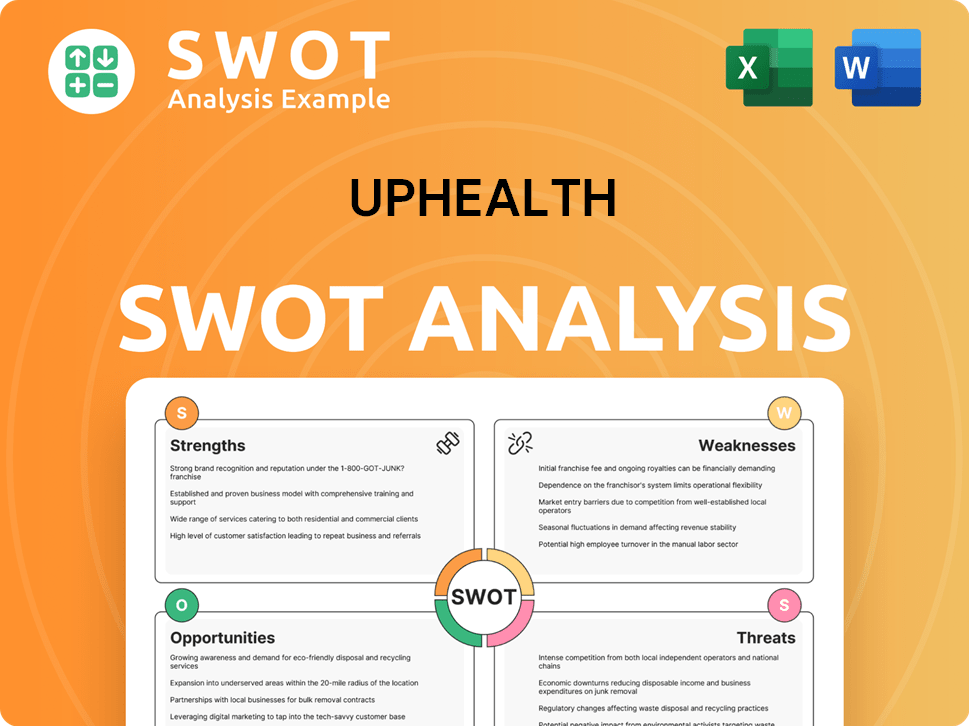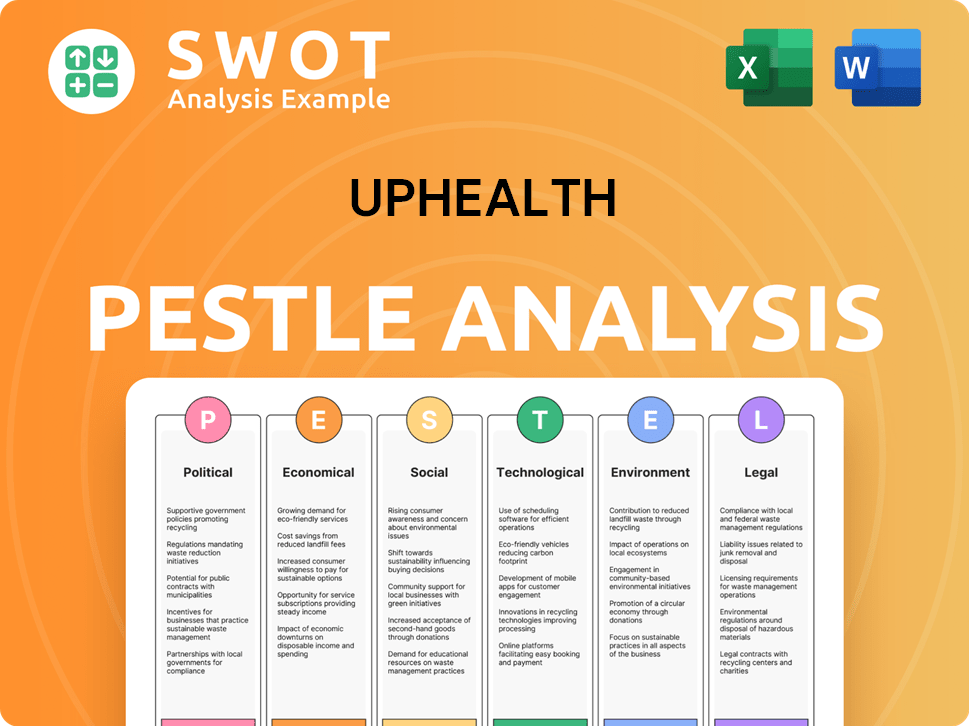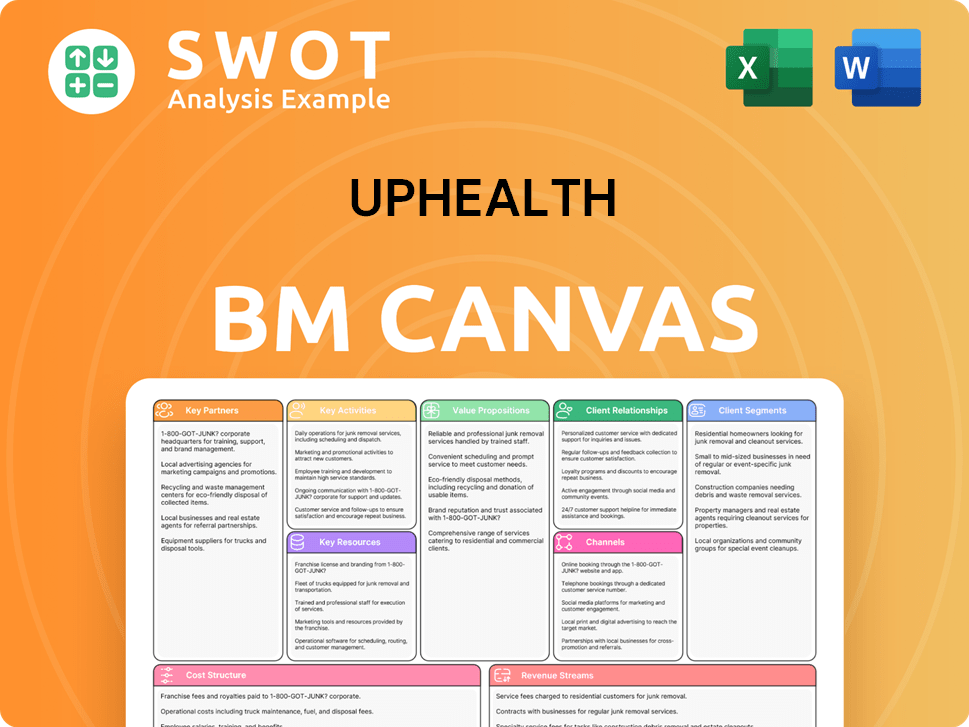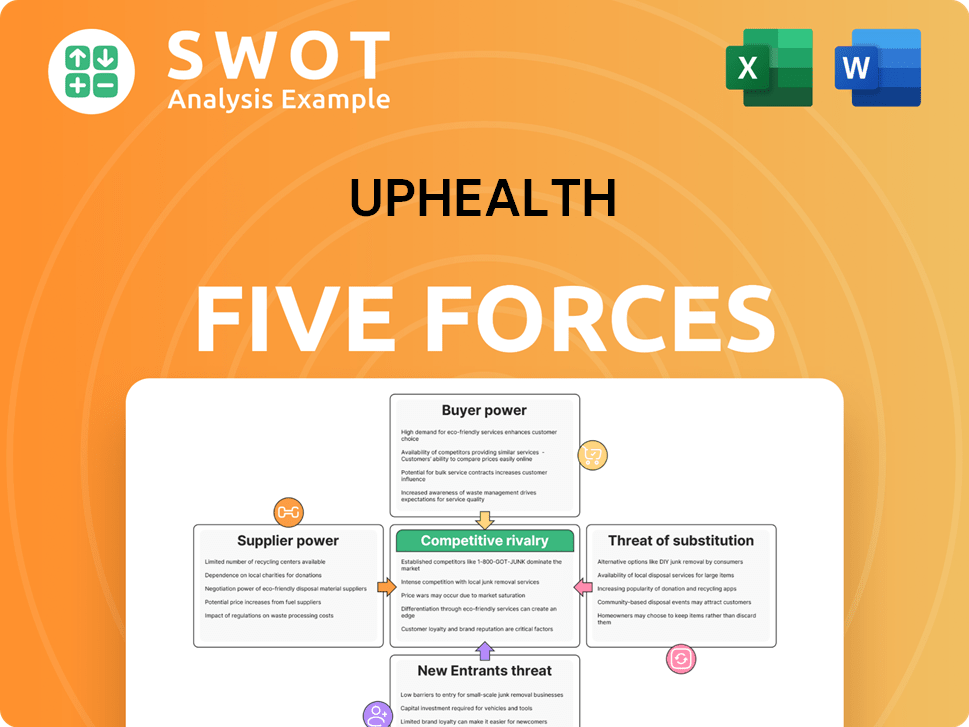UpHealth Bundle
Can UpHealth Thrive in the Evolving Digital Health Arena?
UpHealth, Inc. is navigating a pivotal transition, concentrating its efforts on behavioral health after a strategic shift. Founded in 2019, the company initially aimed to revolutionize healthcare through digital solutions. This UpHealth SWOT Analysis helps to understand their current standing and future trajectory.

This UpHealth company analysis delves into the company's growth strategy, particularly its pivot towards behavioral health, and explores its future prospects within the dynamic telehealth market. Understanding UpHealth's digital health solutions, recent strategic moves, and its competitive positioning is essential for anyone evaluating potential investment opportunities or seeking insights into the healthcare technology sector. We'll examine UpHealth's business model explained, including potential revenue streams and expansion plans.
How Is UpHealth Expanding Its Reach?
The primary focus of the UpHealth growth strategy centers on the expansion of its behavioral health business, specifically TTC Healthcare. This strategic shift follows the divestiture of other business segments, signaling a concentrated effort to capitalize on the growing demand for mental health and substance use disorder treatment services. The company's future prospects are heavily reliant on the successful scaling of TTC Healthcare within the telehealth market.
UpHealth's company analysis reveals a strategic pivot towards a specialized area, aiming to meet the increasing needs of patients seeking mental health and substance use disorder treatment. This focus is driven by the growing recognition of the importance of mental health services and the increasing demand for accessible care. The company's expansion plans are now primarily within the behavioral health sector, aiming to increase its market share.
In 2023, TTC Healthcare experienced significant growth, with revenue increasing by 42% to $44 million, and gross margins expanding to 57%. This financial performance underscores the potential for growth within the behavioral health segment. The company's strategic focus on scaling TTC Healthcare is further supported by its operational model, which includes four facilities offering a continuum of care, including detoxification services, residential care, and outpatient programs. This demonstrates a commitment to comprehensive patient care.
UpHealth is concentrating on scaling its behavioral health business, TTC Healthcare, following the divestiture of other segments. This strategic shift aims to capitalize on the growing demand for mental health and substance use disorder treatment services within the digital health space.
In 2023, TTC Healthcare demonstrated significant growth, with revenue increasing by 42% to $44 million. Gross margins expanded to 57%, indicating improved profitability. This financial performance highlights the potential for further growth within the behavioral health sector.
TTC Healthcare operates four facilities offering a continuum of care, including detoxification services, residential care, and outpatient programs. This comprehensive approach supports patient needs across various stages of treatment. The company's strategy includes leveraging public sector partnerships for growth.
The majority of TTC Healthcare's revenue, 79%, comes from government contracts, with 19% from commercial payers. This revenue model indicates a strategy that includes leveraging public sector partnerships for growth. This approach provides a stable revenue base.
The primary expansion initiative involves scaling TTC Healthcare, focusing on increasing patient capacity and reach within the behavioral health sector. The company's legal victories, such as the upholding of a $110 million arbitration award, aim to protect financial interests and support future operational strategies.
- Scaling TTC Healthcare to increase patient capacity.
- Leveraging government contracts for revenue growth.
- Protecting financial interests through legal victories.
- Focusing on the telehealth platform for service delivery.
For more insights into how UpHealth generates revenue and its overall business model, you can explore the Revenue Streams & Business Model of UpHealth.
UpHealth SWOT Analysis
- Complete SWOT Breakdown
- Fully Customizable
- Editable in Excel & Word
- Professional Formatting
- Investor-Ready Format

How Does UpHealth Invest in Innovation?
The innovation and technology strategy of the company is primarily focused on enhancing its behavioral health solutions. This is achieved through the deployment of digital platforms designed to facilitate remote healthcare consultations. These platforms also streamline patient care management, ensuring efficient service delivery.
The company leverages data-driven insights to improve service performance. This approach aligns with the healthcare industry's broader trend of utilizing technology to improve patient outcomes. It also enhances operational agility, which is crucial in the fast-evolving healthcare landscape.
The company's historical offerings included digital platforms like Thrasys for integrated health management and MedQuest for pharmacy management. The focus on digital transformation in healthcare, including the use of AI and automation, is a significant trend in the industry.
The core strategy centers on digital platforms. These platforms support remote healthcare consultations and streamline patient care. They also provide data-driven insights to improve service performance.
The company's approach aligns with the healthcare industry's shift towards technology. This includes leveraging digital tools to improve patient outcomes. It also enhances operational efficiency.
Past offerings included platforms like Thrasys and MedQuest. These platforms focused on integrated health management and pharmacy management. They highlight the company's history of digital innovation.
The healthcare industry is increasingly using AI and automation. This trend aims to reduce administrative burdens and enhance clinical decision-making. It also seeks to improve patient engagement.
The company is committed to operational excellence. This involves integrating clinical services with digital healthcare delivery. It ensures optimized service delivery in the behavioral health market.
The company aims to maintain a forward-thinking position in the market. This is achieved through ongoing investment in technology. It allows the company to adapt to evolving industry demands.
The company’s technology strategy is geared towards digital platforms for behavioral health. This involves telehealth solutions and data analytics to improve patient care and operational efficiency. The focus on AI and automation is a significant trend in the healthcare sector, with the goal of reducing administrative burdens and enhancing clinical decision-making, as discussed in the Marketing Strategy of UpHealth.
- Digital Platforms: Emphasis on platforms for remote consultations and patient care management.
- Data-Driven Insights: Utilizing data analytics to improve service performance and patient outcomes.
- AI and Automation: Integrating AI to reduce administrative burdens and improve clinical decisions.
- Operational Excellence: Streamlining clinical services with digital healthcare delivery.
UpHealth PESTLE Analysis
- Covers All 6 PESTLE Categories
- No Research Needed – Save Hours of Work
- Built by Experts, Trusted by Consultants
- Instant Download, Ready to Use
- 100% Editable, Fully Customizable

What Is UpHealth’s Growth Forecast?
The financial outlook for UpHealth reflects a strategic shift towards its behavioral health segment and significant restructuring efforts. The company has been actively divesting assets to reduce debt and stabilize its financial position. This transformation is crucial for navigating the competitive landscape and capitalizing on opportunities within the telehealth market.
UpHealth's recent financial performance highlights the impact of these strategic moves. The company's focus on streamlining operations and optimizing its portfolio is evident in its improved gross margin and adjusted EBITDA. These improvements suggest a potential for sustainable growth as UpHealth continues to refine its business model and expand its digital health solutions.
The company's ability to execute its strategic plan and adapt to the evolving healthcare technology landscape will be critical for its future success. For a deeper understanding of the competitive environment, you can explore the Competitors Landscape of UpHealth.
In 2023, UpHealth reported revenues of $130.0 million, a decrease from $158.8 million in 2022. This decline reflects the impact of strategic divestitures and restructuring initiatives aimed at streamlining operations and focusing on core business segments.
The net loss attributable to UpHealth for 2023 was $57.8 million, an improvement compared to a net loss of $223.0 million in 2022. This improvement indicates progress in managing costs and improving operational efficiency.
The gross margin for 2023 was 54%, up from 44% in 2022, showing improved profitability. Adjusted EBITDA for 2023 was $19.6 million, a significant increase from $3.2 million in 2022, reflecting better cost management and operational performance.
The sale of Cloudbreak Health for $180 million in March 2024 was a key strategic move to reduce debt. Approximately $139 million from the sale was allocated to a Notes escrow, aimed at satisfying the 2026 notes and repurchasing 2025 notes.
The company's long-term debt is expected to be significantly reduced following the strategic divestitures. After the repurchase of 2025 notes, only about $37 million of 2025 notes are expected to remain outstanding, which indicates a stronger financial position.
Analyst forecasts predict an annual revenue of $158 million for 2025. The forecasted annual EBIT for December 31, 2025, is -$4 million, while the forecasted annual EBITDA for the same period is $20 million.
The stock price of UpHealth Inc. as of May 22, 2024, was trading at $0.0002. This reflects the challenges and opportunities facing the company as it navigates the competitive telehealth market and implements its growth strategy.
- The stock price is an indicator of investor confidence and market perception.
- UpHealth's financial performance and strategic initiatives will influence future stock performance.
- Market analysts closely monitor the company's progress and adjust their forecasts accordingly.
- The digital health sector's growth and telehealth market trends are key factors.
UpHealth Business Model Canvas
- Complete 9-Block Business Model Canvas
- Effortlessly Communicate Your Business Strategy
- Investor-Ready BMC Format
- 100% Editable and Customizable
- Clear and Structured Layout

What Risks Could Slow UpHealth’s Growth?
The path forward for UpHealth, focusing on its behavioral health services, is fraught with potential risks and obstacles. Navigating the complex healthcare landscape, especially within the evolving telehealth market, requires careful consideration of both internal and external factors. These challenges could significantly impact the company's ability to achieve its growth strategy and realize its future prospects.
Market competition within the digital health and telehealth sectors is intense, requiring continuous innovation and strategic adaptation. Regulatory changes, particularly concerning digital health and behavioral health services, present ongoing hurdles. The company's past financial and legal issues, and the recent delisting from the NYSE, further complicate its operational and financial stability.
UpHealth's ability to secure sufficient capital, manage debt, and effectively execute its growth plans are critical. The company's strategic decisions, such as divestitures and ongoing legal actions, are crucial in mitigating these risks. Understanding these challenges is essential for a comprehensive UpHealth company analysis.
The telehealth market is competitive, with numerous players vying for market share. Competition includes established healthcare providers and new entrants offering digital health solutions. The rapid pace of innovation requires continuous adaptation to maintain a competitive edge. This is a key factor in understanding UpHealth's competitive landscape.
Regulatory changes in healthcare, especially those related to digital health and behavioral health services, pose a constant challenge. Compliance with evolving regulations, such as those concerning data privacy and telehealth reimbursement, is crucial. Staying abreast of these changes is essential for sustained growth.
Past legal and bankruptcy proceedings, particularly involving UpHealth Holdings and its subsidiaries, have created operational complexities. Resolving these issues and maintaining financial stability is vital for future growth. The $110 million arbitration award is a positive step, but ongoing diligence is necessary.
Technological advancements can quickly disrupt the digital health sector, requiring continuous innovation. The company must invest in new technologies and adapt to changing consumer preferences to remain relevant. This impacts UpHealth's telehealth platform and digital health solutions.
Maintaining sufficient capital and managing debt obligations are critical for operational continuity. The company's ability to secure funding and manage its financial resources directly affects its ability to execute growth plans. This impacts UpHealth's financial performance review.
The recent delisting from the NYSE and subsequent trading on the over-the-counter market present challenges related to investor confidence and access to capital. This can affect UpHealth's ability to attract investment and support its growth strategy. Understanding this is vital for UpHealth investment opportunities.
UpHealth is taking strategic steps to address these challenges. The sale of Cloudbreak Health is an example of divestitures aimed at reducing debt and focusing resources. Ongoing legal actions are also crucial for protecting its financial interests. These actions are part of UpHealth's growth strategy in telehealth.
The successful navigation of these risks will significantly influence UpHealth's future prospects. The company's ability to adapt to market changes, comply with regulations, and maintain financial stability will determine its long-term success. For more on this, explore the Target Market of UpHealth.
UpHealth Porter's Five Forces Analysis
- Covers All 5 Competitive Forces in Detail
- Structured for Consultants, Students, and Founders
- 100% Editable in Microsoft Word & Excel
- Instant Digital Download – Use Immediately
- Compatible with Mac & PC – Fully Unlocked

Related Blogs
- What are Mission Vision & Core Values of UpHealth Company?
- What is Competitive Landscape of UpHealth Company?
- How Does UpHealth Company Work?
- What is Sales and Marketing Strategy of UpHealth Company?
- What is Brief History of UpHealth Company?
- Who Owns UpHealth Company?
- What is Customer Demographics and Target Market of UpHealth Company?
Disclaimer
All information, articles, and product details provided on this website are for general informational and educational purposes only. We do not claim any ownership over, nor do we intend to infringe upon, any trademarks, copyrights, logos, brand names, or other intellectual property mentioned or depicted on this site. Such intellectual property remains the property of its respective owners, and any references here are made solely for identification or informational purposes, without implying any affiliation, endorsement, or partnership.
We make no representations or warranties, express or implied, regarding the accuracy, completeness, or suitability of any content or products presented. Nothing on this website should be construed as legal, tax, investment, financial, medical, or other professional advice. In addition, no part of this site—including articles or product references—constitutes a solicitation, recommendation, endorsement, advertisement, or offer to buy or sell any securities, franchises, or other financial instruments, particularly in jurisdictions where such activity would be unlawful.
All content is of a general nature and may not address the specific circumstances of any individual or entity. It is not a substitute for professional advice or services. Any actions you take based on the information provided here are strictly at your own risk. You accept full responsibility for any decisions or outcomes arising from your use of this website and agree to release us from any liability in connection with your use of, or reliance upon, the content or products found herein.